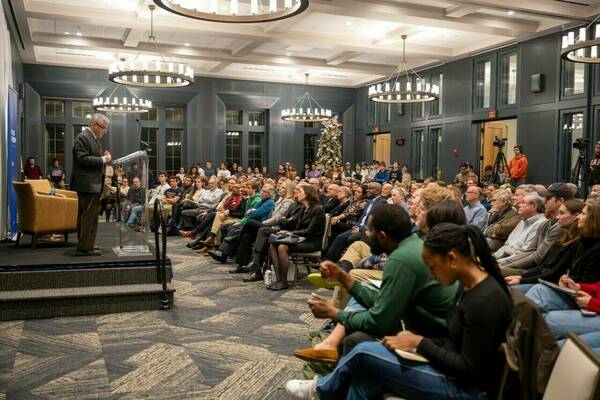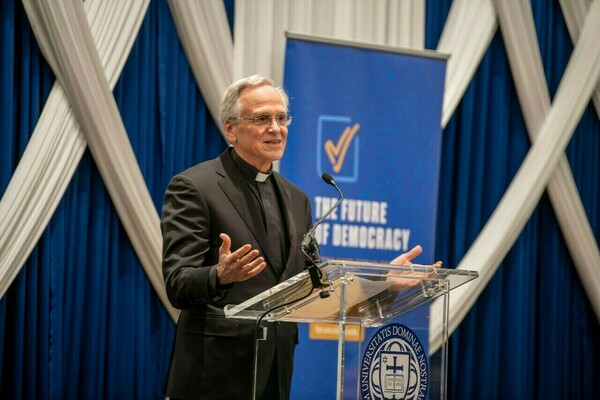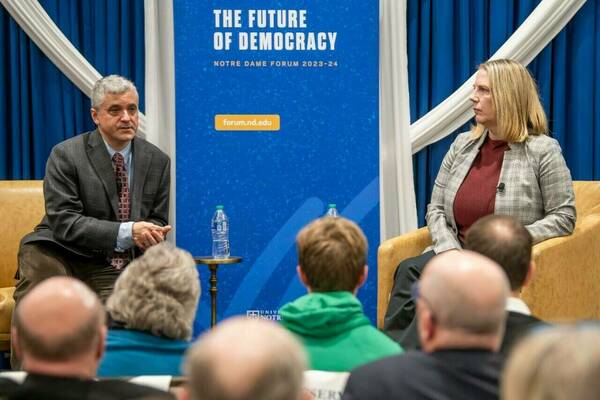Professor, bestselling author delivers Notre Dame Forum lecture on threats to democracy

In front of a standing-room-only crowd of more than 300 people on Monday (Dec. 4), Harvard University professor and New York Times bestselling author Steve Levitsky delivered a passionate lecture that was part U.S. and world history and part future-state prediction, as he described how democracy in the United States — as well as democracies around the world — risk sliding into minority rule.
Levitsky is the co-author, with Daniel Ziblatt, of two bestselling books that explore this theme, “How Democracies Die” and “Tyranny of the Minority: Why American Democracy Reached the Breaking Point.”
The event was part of this year’s Notre Dame Forum on “The Future of Democracy.” University President Rev. John I. Jenkins, C.S.C., offered brief remarks at the start of the evening, noting that the Forum’s theme is designed “to foster respectful dialogue and reflections on the rising threats to democracy at home and abroad, and on how democracy can be reinvigorated to meet the challenges of our time.”

Levitsky opened his presentation by citing data from the nonprofit organization Freedom House’s global freedom index, which annually scores the strength of a country’s democracy from a low of zero to a high of 100. A decade ago, U.S. democracy received a score of 92 out of 100; today, that score is 83.
To understand the reason for this decline, Levitsky discussed the historic transition the U.S. has undergone over the past 50 years to become a multiracial democracy, a result of increased diversity in our population and in our political structures.
“The U.S. is undergoing an unprecedented transition, an historic transition — a transition to a multiracial democracy in which a previously dominant group loses its dominant status,” Levitsky said. “That, we argue, has triggered an authoritarian reaction among a minority of Americans.”
In addition, Levitsky argued, the situation is exacerbated by the U.S. Constitution. He argued that the Constitution inadvertently empowers this emerging authoritarian minority through the inclusion of mechanisms like the Senate, the Electoral College, or the lifetime appointment of Supreme Court justices, all structures that are not always representative of popular sentiments and allow overrepresentation for minority viewpoints.
In spite of these realities, Levitsky noted that individuals throughout U.S. history have worked to adapt systems in order to bolster democracy, and that these efforts have declined over the last 50 years.
“Back in 1787, George Washington wrote a letter to his nephew, in which he described the new constitution written two weeks earlier as an imperfect document, and said that it would be up to future generations to make it better,” Levitsky said. “And generations of Americans did just that: From the Bill of Rights to the important Reconstruction Amendments to the expansion of suffrage to Progressive Era reforms to the Civil Rights era, Americans worked to make our system more democratic.
“But over the last half century, we’ve stopped doing that work. We need to get back to that reformist tradition. And we need to put institutional reform back on the public agenda; we need to start discussing it. If we don’t, we risk a slide into minority rule.”
All these forces have brought the country to the precipice of what Levitsky considers a watershed 2024 presidential election that will set the tone for U.S. democracy into the future.
He emphasized the importance of U.S. citizens recommitting themselves to working to strengthen U.S. democracy, and offered some concrete recommendations for building a broad, bipartisan coalition to prevent democratic backsliding. Levitsky suggested that it might be time to consider putting Republicans on Democratic Party tickets in 2024, and finding other ways to set aside major policy differences for the sake of resisting partisan gridlock.
“That’s a big ask, but these are not ordinary times. If we behave as if we are in ordinary times we could lose our democracy,” Levitsky said. “We stand at a crossroads today. America will either be a multiracial democracy in the 21st century or it will not be a democracy. Both of those roads lie before us and there is no turning back.”

Following Levitsky’s remarks, Christina Wolbrecht, professor of political science and the C. Robert and Margaret Hanley Family Director of the Notre Dame Washington Program, moderated a discussion that included questions from those in attendance. Questions addressed wide-ranging topics including the role of the military in democratic systems, attempts to curtail voting rights and the impact of global politics on U.S. democratic structures.
The full presentation is available here.
Latest University News
- Notre Dame elects two new TrusteesTwo new Trustees — John F. Crowley and Danielle Walker Merfeld — have been elected to serve on the University of Notre Dame’s Board of Trustees effective July 1. …
- Alumni Association awards 2025 Lennon Life PrizesThe Notre Dame Alumni Association recognized nine alumni clubs as recipients of the Lennon Life Prize — part of the Chuck and Joan Lennon Gospel of Life Initiative, a set of programs focused on encouraging the University’s dedicated network of clubs to uphold the value of life at all stages.
- Jenkins Center for Virtue Ethics receives grant to advance love-based ethical frameworkThe University of Notre Dame has received a $10 million grant from the John Templeton Foundation to support a project titled Love and Social Transformation: Empowering Scholars and Social Innovators to Develop the Love Ethic.
- Notre Dame honors Carmi and Chris Murphy with 2025 Sorin AwardIn recognition of their contributions to the University of Notre Dame and service to the South Bend community, Carmi and Chris Murphy were presented with the 2025 Rev. Edward Frederick Sorin, C.S.C., Award on May 31 at the Alumni Association’s annual reunion celebration.
- In Memoriam: Sriram SomanchiSomanchi was a widely respected teacher and scholar whose research broke new ground in the academic landscape by drawing on social science and statistical machine learning to develop and deploy methods that bridge these related but distinct disciplines.
- Notre Dame announces next step for emerging tech and talent district in downtown South BendThe Tech and Talent District, a keystone of the city of South Bend’s Downtown South Bend 2045 plan, has advanced a step closer to implementation via a partnership between the University of Notre Dame and Ancora to pursue the development of the first phase of the district.












